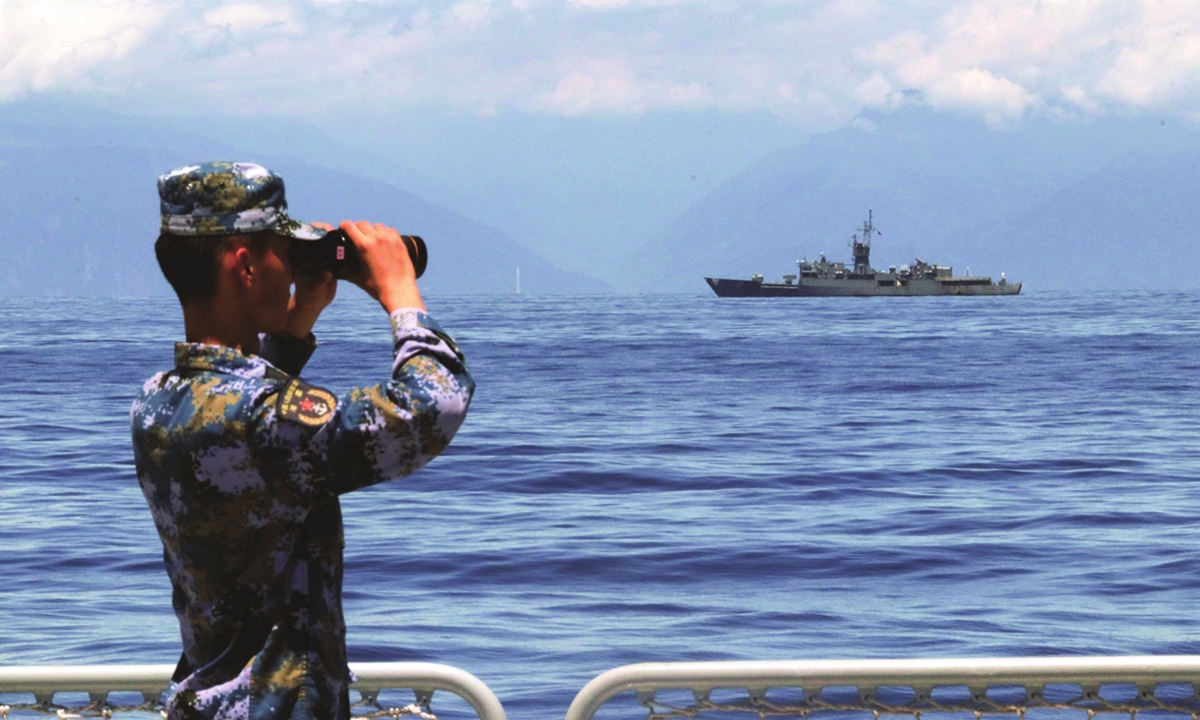
A soldier looks through binoculars during combat exercises and training of the navy of the Eastern Theater Command of the Chinese People's Liberation Army (PLA) in the waters around the Taiwan island, August 5, 2022. Photo: Xinhua
US politics, polarized and increasingly radical, are a minefield for China-US relations with the Taiwan question becoming the most dangerous, Chinese observers warned on Friday, citing a Republican-backed, provocative resolution and house speaker Kevin McCarthy's possible visit to the island.
They stressed that the US' repeated provocations over China's red line will only strengthen China's determination to address the Taiwan question once and for all.
A group of 18 House Republicans in the US Congress introduced a new resolution on Wednesday calling on Washington to "diplomatically recognize" the island. Claiming the US' one-China policy "antiquated," the resolution urged US departments to work toward recognizing Taiwan island's status in international organizations.
One of the 18 sponsors is
Michelle Steel of California, who was recently appointed to the new House Select Committee on Strategic Competition between the US and the Communist Party of China (CPC), according to media reports. In another provocation, McCarthy is reportedly set to visit Taiwan island some time this year, likely in spring. The Pentagon is preparing for the trip regarding security logistics, Punchbowl News, a Washington-based political news daily, cited an anonymous official as saying.
Lü Xiang, an expert on US studies and a research fellow at the Chinese Academy of Social Sciences in Beijing, believes that if McCarthy makes the visit, which is highly likely, China's response against the US would be of higher intensity than that after then house speaker Nancy Pelosi's provocative visit to Taiwan island in August 2022.
Besides China announcing sanctions against Pelosi and her immediate family, the Chinese People's Liberation Army (PLA) in August held joint drills in the Taiwan Straits which were of unprecedented scale and duration, forming a blockade of the island.
China has drawn a clear-cut red line, but if the US regards it as not clear enough and keeps testing the line, "we don't mind reinforcing it," Lü told the Global Times on Friday.
The August drills demonstrated the PLA's capabilities of seizing air superiority and control of the sea, and an escalation of response could be a larger-scale engagement of PLA naval and air forces, or more training courses, such as amphibious landing operations, military analysts said.
Song Zhongping, a Chinese military expert and TV commentator, cited a Chinese saying that "quantitative changes lead to qualitative changes."
The US keeps hollowing out its political commitment by passing bills, selling weapons and making provocative visits to the island of Taiwan. Its provocations keep piling up in quantities, which will lead to a qualitative change - China has to address the Taiwan question once for all, Song told the Global Times on Friday.
Behind the highly provocative statements of the resolution is the Republican-controlled House acting extraordinarily radically in playing the "Taiwan card," observers said. The two US parties have little common agenda, yet the "China threat" and the Taiwan question are part of the limited common language the two parties share to keep the US political vehicle functioning.
Lü pointed out the US' dangerous provocations over the Taiwan question are a spillover of its chaotic, out-of-control internal politics. Republicans will keep making trouble in the House to thwart the Biden administration's attempts to manage the US relations with China.
However, there are quite a number of US politicians who allow personal and party interests to override US interests, continuously poison China-US relations and create minefields for the relationship, Lü said.
Those US moves cast a shadow over US Secretary of
State Antony Blinken's reported visit to China, over which Song holds low expectations for a positive outcome.
Amid the US' continuous provocations, Blinken's visit could be nothing more than a diplomatic contact between the two major countries, Song said. Communication is better than conflict, but communication would be pointless if Blinken, who is supposed to ease bilateral tension, just comes to repeat the US' coercive methods.
Lü said that how China-US relations will develop in the near future depends largely on whether the Biden administration will create room for discussions on pragmatic issues or whether it sticks to an agenda of irreconcilable conflicts. "China's resolve to defend its territorial integrity and security never wavers."




